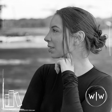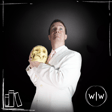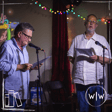Become a Creator today!Start creating today - Share your story with the world!
Start for free
00:00:00
00:00:01

248 Olivie Blake | International Bestselling Fiction Author
NYT and Sunday Times bestseller Olivie Blake joins us this week to chat about her new book "Girl Dinner", her writing process, how she went self-publishing to traditional publishing and her upcoming graphic novel with illustrator, Little Chmura.
Support the show on Patreon! 💖 And get extended episodes, ad-free and a week ahead of everyone else. 🙏
For audio listeners:
Listen to The Chosen Ones and Other Tropes, Jamie's other podcast with Melissa Welliver and Naomi Gibson! 📚
Follow on socials! 🥳
Transcript
Writing Challenges and Expectations
00:00:00
Speaker
Ooh, a spicy question. love it. Because the writing is sort of everything, right? Like you can fix plot holes, but if the writer isn't there. So some readers love that and some readers are like, but I wanted more of this. So it's kind of, it's kind of a gamble.
Meet Olivia Blake
00:00:14
Speaker
Hello and welcome back to the Right and Wrong podcast. On today's episode, I am with a New York Times bestselling author who writes all sorts of fiction for both adult and YA.
00:00:25
Speaker
It's Alexine Farrell-Folmuth, AKA, Olivia Blake. Hello. Hello. so You did it, by the way. That is correct. I did it. We had a discussion about pronunciation of Alexine, which a lot of people get wrong. And you did right. And so we're best friends now.
00:00:41
Speaker
And I think my UK publishers would want me to say that I'm also a Sunday Times bestselling. And the Sunday Times were selling, there you go. Lots of best-selling places um here.
Introducing 'Girl Dinner'
00:00:52
Speaker
So starting things off, always like to talk about um your latest publication, the new book Girl Dinner, which is out October 21st in the US s and the 23rd in the UK.
00:01:05
Speaker
Tell us a little bit about it. Okay, well, Girl Dinner is a satire about a cannibal sorority. ah It is arguably, i mean, i'm I'm seeing people be a little bit confused about how to refer to it. um It's been, you know, sort of filed under horror in a few places, but it's not very gory. I like to bring this up because I think people are like, how do I want to approach this?
00:01:30
Speaker
subject matter. I like to think of it as more of a psychological thriller. It's not about the act of eating. It's about the decision of who to eat. um Okay.
00:01:42
Speaker
But the reason that I wrote Girl Dinner, basically Girl Dinner is about two women.
Exploring Femininity and Culture
00:01:46
Speaker
It's about 19-year-old in ah university. um She's a sophomore at an American college, and she is rushing what is called the house. It's the most prestigious sorority on campus.
00:01:58
Speaker
And it's sort of, it represents this... you know, threshold to a successful career, to sort of having it all. the The girls that are in the sorority are very beautiful, they're very intelligent, they turn out to be, you know, these incredibly important people in their career.
00:02:13
Speaker
um And then there's, you know, <unk> So that's Nina. And then there's Sloan, who's an adjunct professor, and she has recently given birth. She has an 18-month-old daughter, and she's just going back to work.
00:02:25
Speaker
And she gets sort of recruited in a similar way to become the ah faculty advisor for the sorority. And she is also taken in by the alumnae and the the the way that they, too, are almost extraordinarily beautiful and accomplished. And so both women are kind of like, what does it take to become this kind of woman? And Girl Dinner is my, it's me sort of grappling with the idea of the, you know, of femininity culture and and what that means and what it means to be a good woman and what feminism is right now. Because I think it's also this sort of generational struggle between
00:03:06
Speaker
the You know, the very tired girl bosses. I'm a millennial myself. I was born in 1989 along with Taylor Swift. And, you know, we're like, we're pretty tired, right? Like we were told that if we were just cool girls and we were just perfect and if we were just not like other girls, then we would have everything we ever wanted and it would be fine.
00:03:26
Speaker
And the economy said that's not true. And now we don't really know what to do with ourselves, but we are also sort of alarmed looking at the younger Gen Z that's being really influenced by these conservative online trends. There's the trad wives and the clean girls and this very sort of alarming traditionalist thing that is very much the exact the exact sort of vibe that could hold all women back. So it's this it's it's this, I wanted to write about that tension, although did I answer any questions?
00:03:58
Speaker
I'm not sure.
00:04:01
Speaker
Okay, but there's definitely a lot being discussed behind the sort of um fun fiction sorority cannibalism stuff.
Sorority Experiences
00:04:10
Speaker
Right, right. ah Of course, of course, the very fun, the the the fun aspect of the book is certainly the cannibalism.
00:04:18
Speaker
That's there for, yes that's purely there for camp. sentence. Yeah.
00:04:24
Speaker
Yes, and Girl Dinner is such a good name for the for the whole concept all tied together. have to ask, ah you Have you ever been in a sorority? ah Yes, I was in a sorority. I was actually vice president of my sorority. Okay.
00:04:38
Speaker
And I held the role of what I like to joke as like, I was like um ah the the supreme judge of sorority court. Like basically if anyone if anyone got in trouble, if their grades were slipping or you know they had like a behavior issue, if they embarrassed us at ah at an event, you know?
00:04:59
Speaker
If it's also there, I'm making light of it, but it is also anything more serious, like if anyone was suspected of an eating disorder or anything like that, we just wanted to check in with them, they had to have this top secret meeting with me.
00:05:11
Speaker
So for about a year, I was considered the scariest person in my sorority. um And that was a very ah fun and interesting experience.
00:05:23
Speaker
Okay. So I'd imagine some of that kind of experience and the kind of structure of it is kind of influenced in this book. Well, I think, you know, think that people are going to be, uh, surprised maybe by the way that this is not, this book is not necessarily a condemnation of femininity culture. It is not ah condemnation of sorority life either, even though there are definitely problems. I mean, there's, there are definitely a lot of issues baked into the Greek system, of course.
00:05:50
Speaker
But it's also something that like, it's something that I loved being part of. It's something that made me who I am. I like to joke that I didn't know how to speak girl until I joined sorority. I like just didn't understand like ah how, how to be part of a large group of women. And I feel like it, it, it shaped a lot of who I became.
00:06:10
Speaker
um And so it's this it's this it's this very complex love. you know It's the same the same when we're talking about femininity as well. It's this very charge and complex thing because there's obviously very complicated debate about you know what what is a woman, ah what what are what is gender.
00:06:31
Speaker
And it so I kind of wanted to play with play with and against this idea of like, what is fun about femininity culture, which parts of it would we participate in if we could?
00:06:42
Speaker
um But also what is damaging about it if you can't if you're not considered, you know, if you're not considered acceptable by these standards, and what does that mean for you? Yeah.
00:06:53
Speaker
and And all of that kind of comes together at a time when, you know, if you're at a sorority, if you're at college or university, you know, you're an age where you've left school, you're kind of figuring out how you fit in the world as an adult outside of the sort of childlike, with the the sort of structures that are put in place to for to kind of shepherd you as a young person. Now you're kind of let loose in the world. So it's really so much to discover.
00:07:20
Speaker
Yes. I mean, there's a very there's a very common, um definitely in the US, the idea that you go, a woman would go from her parents' house to the sorority house to her husband's house. And so it's this weird sort of ah mythical bridge to adulthood, which I thought was so interesting, especially because...
00:07:39
Speaker
for traditionally for a lot of women, this is the only time you'd get any degree of freedom. And, uh, yeah, so it was it was really interesting to both like point to all the things that are wrong and also be like, but some of it was really, really enjoyable and fun. Yeah.
00:07:55
Speaker
Yeah. Yeah. Okay. That's cool. Like the cannibalism. Yeah. That was the good stuff. I am, I will say, think this is the, I was raised Catholic. And so I, um, I'm very easily swayed by the aesthetic of ritual.
00:08:12
Speaker
I really enjoy rituals. Uh, like, you know, all of Catholicism is like a very, blood-based ritual. You know, there's, there's arguably some cannibalism in Catholicism. So, um, yeah, this really came together. It's the sweet spot for me intellectually.
00:08:28
Speaker
Okay, that's great. That's cool. It's good to hear.
Career Transitions and Mental Health
00:08:33
Speaker
I'd love to get onto to a bit about you as a writer and your kind of origins as a writer. Is being an author, has that always been your dream since you were young?
00:08:45
Speaker
No. ah So I think that if I told my mother that I was going to major in English, she would have just simply said no. And that would have been the end of it.
00:08:56
Speaker
um i I actually was just talking to my husband about this because he's a high school teacher. I'm not sure what is that the UK.
00:09:07
Speaker
Like grade nine through 12. Okay. Yeah. um So he's, he teaches students who are, i should say he, okay, sorry. I'm trying to, I'm trying to figure out how to organize my thoughts going into this conversation.
00:09:21
Speaker
He just changed school districts. He used to work for um the school district for the city of LA, which is massive. You know, the city of LA is, is enormous and it covers all sorts of demographics. And he just moved to a smaller,
00:09:34
Speaker
ah you know, let's just say wealthier school district. And he used to teach physics and AP physics at the highest level. So he taught it to 11th and 12th graders who are about to go to college.
00:09:46
Speaker
Now he teaches physics and AP physics to younger students. They actually start in grade nine. And so he said, the difference is that this school is essentially preparing these kids for what they're going to major in, what their career will eventually be.
00:10:02
Speaker
And he was telling me about all these kids that are trying to prepare for like, there's different there's different kinds of AP physics. There's some that are for if you know you're going to go into engineering or if you know you're going to do something where physics is a requirement.
00:10:15
Speaker
And i was like, can you imagine looking a 14-year-old in the eye and saying, choose the rest of your life right now? Like, does that not feel irresponsible as a parent, as a fiduciary member of this community? Like, yeah doesn't it feel like a lie to tell a child that they should know exactly what they're going to become? I have no idea why I started on this rant, actually.
00:10:39
Speaker
um Oh, yes, that's right. So, but all that being said, like, this is something that I feel right now as someone who... um was sort of led down a ah certain path. My mom, you know, I think by that from the time I was 14, it was all about like, pick pick a major that will give you a safe career.
00:11:00
Speaker
She wanted me to major in macroeconomics. I don't know what I would have done with macroeconomics. I think I feel even more bleak about the world. i be whichitchy I think what she means is like, she probably wanted me to be an accountant or in finance, which my brother is, so, you know.
00:11:18
Speaker
um But I decided, i chose as my safe career urban planning. So I went to school for urban planning and right away in my my first year of university, my professor pulled me aside was like, you're actually too smart to do this work.
00:11:33
Speaker
I mean, she said it in a very flattering way, but I see what she means now, that if if you're working in you know in a municipal office, if you're working in government, you're very much like a cog in a machine. And I was very interested in creative problem solving, but you can't really be creative without power.
00:11:50
Speaker
And she recognized that in me and suggested that I become a lawyer instead. It's the kind of thing that always happens if you're a smart girl. People are like, go to law school, babe.
00:12:01
Speaker
Um, yeah, I, I ended up getting my master's in urban planning because I graduated from college early because I had taken all those AP classes. I don't know why. And then, uh, and then I went to law school and I dropped out of law school because it's another place where you're kind of a cog in a machine. You know, as a lawyer, you can only do what the law allows you to do.
00:12:21
Speaker
And um so when I dropped out of law school, that was when I wrote a book to like, just, I don't know, I call it my primal screen manuscript that I was just like, I don't know what to do anymore. Like, I feel like I've been trying to do all these things that were supposed to keep me safe, but they're driving me crazy.
00:12:42
Speaker
Like at that at that point, I had been diagnosed with bipolar. I was really, really struggling with my mental health. Like I, I think i I had known for a long time that I had mental health issues.
00:12:55
Speaker
um But, you know, I'm an eldest daughter. i was like, it's fine. We'll just get through this. And then i met my husband and I realized I wanted to build a life with another person. And you kind of don't want to be your craziest self around someone whose life that you want to be good and comfortable and easy.
00:13:13
Speaker
So that was kind of around the time that I was like, all right, this isn't working. Like trying to be, trying to be safe, trying to be acceptable, trying to be the person that I'm told I need to be is not happening for me.
00:13:27
Speaker
um So I like to make the joke that I never wanted to be a writer. It's just that I couldn't do anything else.
From Fan Fiction to Original Works
00:13:33
Speaker
Like that it was the only thing that I actually felt like I'm contributing something that I'm, you know, i like, it's,
00:13:41
Speaker
doing creative work, this is my best brain. This is the best version of a brain that sometimes likes to try to destroy itself, you know? And um i I really relate to to people, you know, it's that it's that immigrant mindset of just like, I'm here to keep my head down and work. I'm here because I will only be accepted if I am this sort of model immigrant, you know, if ah if I do all these things and I'll keep myself safe and I'll keep my family safe.
00:14:11
Speaker
And that's just not the case. And and so it it turns out that I like to be a little dangerous, I guess. I really love um rejection and uncertainty. And so I'm a writer.
00:14:23
Speaker
You're in the right place. Yes. ah You know, somewhere in there, I started writing fan fiction and that was kind of how I realized like, oh, writing actually makes me makes me feel better. It makes me feel like I'm processing in a more productive way.
00:14:39
Speaker
There are definitely times when I ask myself, like, is this the most useful work I can be doing? And that's just a question I've decided to throw away. That's not a question one can ask themselves.
00:14:50
Speaker
Yeah, no, I understand. What, I have to ask, what what was the subject of the fan fiction? ah Yes, I no longer engage in this um source material, but I wrote Harry Potter fan fiction. I wrote Jermaine fan fiction. I wrote a solid 4 million words of it, and it's all still available if you want to read it.
00:15:10
Speaker
It's on AO3 or for the real throwbacks, fanfiction.net. Okay. Oh, gee. yeah Okay. So, so the writing sort of just happened and then you were writing foundation and then, so when did you first kind of write and finish a novel that was entirely yours?
00:15:31
Speaker
Well, I have a lot of caveats. Technically, I wrote my first book when I was ah quite young for a library competition. I like to bring this up because I love libraries so much, so this is my way of saying shout out to libraries.
00:15:46
Speaker
There was a ah summer writing competition, and I just distinctly remember that I was so surprised to have won because it was the first time i wrote a book. Like, truthfully, it was basically a rehash of Tamora Pierce's Tortall books.
00:16:01
Speaker
I mean, that's what I was into at the time. But there were... the ah The other people who had written were boys that now that write what I now call sword porn. So I just assumed they were going to win. And I was i was pretty pleased with myself. um And then I wrote the book.
00:16:16
Speaker
When I dropped out of law school, I wrote my Primal Scream manuscript. That was about, you'll never guess, a 24-year-old girl having a career crisis. Um... Good, good. She was having, she was having, you know, the quarter life crisis.
00:16:31
Speaker
um And I, you know, I did finish it. And but then I think once I started writing Fanpitch and I realized like I i i think I'm a speculative writer at the time, I thought I think I'm a fantasy writer.
00:16:45
Speaker
And then, you know, now at this point in my career, I think my publisher would love to find out what kind of a writer I am. I'm like, me too, guys. ah So so yeah. So now it's just a.
00:16:59
Speaker
Ultimately, i i I like variety. um Even when I was writing fan fiction, I don't know if anyone listening is a fan fiction person, but I wrote a lot of different AUs, which are alternate universes. So um that was my way of exploring genre.
00:17:14
Speaker
I wrote, you know, i wrote like historical bodice rippers and I wrote dystopian things that would have been considered dystopian novels. And I wrote like comedy of errors and retold fairy tales. And I was really just sort of playing. It's what I love about fan fiction. I think for me, fan fiction was, it was, it was, you know, writing for the love of it for the, just for the, the, for the art of it. Um, and then I started self-publishing things that I felt were, you know, they, first of all, they were original works, original characters. They were me trying to actually like write a book of, uh,
00:17:52
Speaker
I don't want to say commercial value, but, but something that is intentional, like this could belong on a shelf. Um, and I was, I was trying to be traditionally published. That took a while. It can take a while.
00:18:05
Speaker
Okay. So did you, were you, you'd written some, some, not some books at this point, some novels, um, were you You were trying to query agents and like, or like look for a publisher and and yes that wasn't working. So you decided to self-publish. Is that the kind of timeline for it? Yes. Yes. Thank you. You made that a lot more succinct for me. You're so good at this. You should have a podcast.
Writing for Experienced Readers
00:18:28
Speaker
i um Yes. Okay. So I wrote fan fiction. old I mean, to be totally honest, what happened with fan fiction is I pissed people off immediately. Like, I...
00:18:40
Speaker
I should have foreseen this in my actual career, but um I take a lot of big swings, I think, in terms of in terms of plot and and the way I conceive of story. And um so, like, within a year, I would say...
00:18:56
Speaker
i had ah I had quite a few popular fan fictions, but also had quite a few people complaining that they were just like, you know, why have you made Hermione Granger a psychopath? And I'd be like, for fun, you know?
00:19:08
Speaker
And so so i started to realize, you know, fan fiction is a medium. I'd love to talk about fanfiction because it's actually a lot more similar to episodic TV writing than to novel writing.
00:19:19
Speaker
Like what you learn when writing fanfiction is essentially how to please a crowd. It's how to build a relationship. It's how to construct a character arc. But it's very, very character based.
00:19:30
Speaker
And it's very, um it's also there are certain expectations with fan fiction, you can kind of mess around with pacing, you know, you can go off on a side quest, and that's fine. But people expect to not be totally thrown off by a twist, right? Like people go in, knowing what tropes they want, knowing they want a certain kind of ending, and all of that has to be sort of marked out for you in advance.
00:19:51
Speaker
But I like to write for um I basically like to write for the reader who's willing to follow me anywhere. Uh, because that's how my brain works. And that's not the case with fan fiction. People want what they want and I respect that.
00:20:04
Speaker
And so it was sort of the, at that point I was like, okay, well, if I want to try writing different things, if I want to write, um, usually when I talk about my work also, I like to make the distinction between,
00:20:17
Speaker
you know, publishing uses the labels adult and young adults adult, adult But I like to consider it more in terms of the experienced reader and the casual reader. The casual reader or the young reader, whatever, is someone who, you know, is either just beginning to read for fun or reading is thought not their main form of entertainment. They're going to pick up fewer books a year, which means that they're going to be less they're they're going to be less familiar with certain kinds of twists, certain kinds of tropes.
00:20:48
Speaker
um They're less likely to see a certain motif coming, you know, right? Like there are certain things that the experienced reader, the adult reader, whatever you want to call it, has can see coming and under they kind of understand what kind of story we're in That's how I think of myself when I'm writing. And I started to realize I want to write for that experienced reader. I want to write for that person who um it's not going to wreck them if they don't get what they want, you know? Yeah.
00:21:15
Speaker
Okay. We, we all have expectations to some degree. I think that's the purpose of genre. Uh, but we also understand what those hallmarks of genre are as the experienced readers, as the people who love books and love reading.
00:21:28
Speaker
um we're more able to recognize them. And so that I think kind of gave me the freedom to do less, um, Oh my gosh. What does, I would i just thought ah a teacher term just popped scaffolding. My husband was explaining
Self-Publishing Success
00:21:43
Speaker
this to Scaffolding. Okay. Yes.
00:21:44
Speaker
Scaffolding. It's a, it's a, I don't know, ah pedagogical term or something that's like, it if someone is struggling with the material, you scaffold it. so you make it slightly easier. or You make something more of a fill in the blank as opposed to open answer.
00:21:58
Speaker
scaffolding is a way of like showing people where we're going and guiding them to the answer so yes so the young adult works this is on some level the fan fiction there's a level of scaffolding happening and i didn't want to scaffold for anyone Okay, right. I see. I see.
00:22:13
Speaker
When it comes to the the indie publishing side of things, it was Atlas Six. was Did you put do the whole series of Atlas Six or was it just the first book that was self-published?
00:22:24
Speaker
No, yes. Okay, so the Atlas Six, thank you again for keeping me on track. I will go off track like 20 more times. Okay, so um the first book I self-published was Masters of Death, which was honestly a real mess. I wrote it out of order. Yeah.
00:22:39
Speaker
And that was like, I was really sort of learning to write a fantasy novel. i was I was learning to reference things that I love to like, um you know, Tonally, Douglas Adams, Lemony Snicket, Terry Pratchett, but do it in my own way. I'd like to say that Masters of Death is the most fan fiction-y of my books because there's many carings and they all get happy endings.
00:23:02
Speaker
Yeah. um So it's that real bridge in between fan fiction and my original work. After that was one for my enemy. That's my Romeo and Juliet retelling, except I was like, what if it's Romeo and Juliet, but ah they come back to life and they're mad about it.
00:23:17
Speaker
and so um ah And then ah wrote a few other things. And then The Atlas Six was my ninth self-published novel. And at that point, ok I was... um I was pretty frustrated. ah you know So and during this time, I had been trying to be traditionally published.
00:23:36
Speaker
So the manuscripts that I had queried, one of which was Alone With You in the Ether, had kind of died on the on the querying, the query room floor, as they say. And so when I wrote The Atlas Six, I thought, I'm not even going to bother to try to find an agent for this.
00:23:53
Speaker
ah What I really wanted to do was experiment with A, writing a series. I really wanted to see what it felt like, because I'd never written a series before, to develop a character over three books.
00:24:05
Speaker
I had it in my head that I was going to do a trilogy and it was going to be very, very character based. And the, the structure that I envisioned for the series, when I was talking about this question of like, what is power? Is there such a thing as power that is not also exploitation? um i thought,
00:24:23
Speaker
What if we have six very unreliable narrators so that the objective truth or the objective reality is something that the audience has to decide for themselves. it's kind of what lives in between the perspective. So I can show you what this character thinks and I can show you what this character thinks and what they interpret. But what is really there is for the reader to decide.
00:24:46
Speaker
And okay so that was me. That was what I went into it thinking I was going to do. um And I wrote the Atlas six and I self-published that January, 2020.
00:24:58
Speaker
You might recognize the year 2020 as a challenging one. um So I wrote the Atlas six. Then I wrote a book called my mechanical romance, which is a young adult um sort of, um,
00:25:12
Speaker
forced proximity, opposites attract romance. And that was in its young adult. And it was what was sort of hot in the market at the time. I never say to write for the market because like the market is basically just a hallucination that all of publishing is having. Right. Like the market is just whatever has recently sold or that's how publishing sees it.
00:25:33
Speaker
Yeah. so at the time i was like maybe this is a slightly more marketable thing so i wrote that i finished it in march like right after lockdown happened was when i finished that manuscript um i sent it around i finally got an agent it got that very quickly i got a preempt from a small house that also happened very quickly And I was like, oh, gosh, i I guess I'm a young adult author, which was alarming to me because I didn't have any other young adult plots in mind or like I had no other young adult ideas.
00:26:03
Speaker
Right. ah So at that point, I put the Atlas series on hold. I knew I was going to finish it. i sort of vaguely knew what was going to happen in the next book. I had written maybe, I don't know, 20,000 words of the Atlas Paradox.
00:26:17
Speaker
Um, at the time that I put it on hold and then I wrote my next YA book, which was 12th Night. Uh, I was pregnant. I had my baby while I was in labor is when the Atlas six went viral.
00:26:30
Speaker
Um, yes, yes. I was like actually in labor. It takes quite a long time. ah labor, uh, ah can do yeah Yeah, my husband was pretty bored.
00:26:42
Speaker
So he was looking at mike i my, my, my self publishing. i don't know. i i don't. I don't like to concern myself with sales and stuff, but my my husband loves data. So he was looking it over and he was like, whoa, like something has really happened with the Atlas Six. Like, look at this. And I was like, I am busy, actually. And then like shortly after I gave birth, someone had messaged me on Tumblr.
00:27:08
Speaker
I love that sentence. Someone had messaged me on Tumblr to tell me that I had gone viral on TikTok. I don't have a TikTok account, so i didn't know anything about it really. But, you know, once I saw that those numbers were starting to move, I had my agent at that point.
00:27:24
Speaker
So I was like, Amelia, I think something is happening with one of my self-published books. And FYI, I'd really like to get it traditionally published because i knew it was going to be a series. And I really want, like being totally honest, I wanted to get the advance for the other books so that I could make that my main job.
00:27:40
Speaker
Um, And she was like, well, you know, with self-publishing, it's hard. I think this this was a very different market than it is now. I think now there's there's more of an understanding that publishers can kind of ah acquire self-published books' rights and republic repackage them in a way that is um lucrative for them. But at the time, this was not the case.
00:28:01
Speaker
At the time, the previously self-published books that had been picked up were essentially... um the marsh not the martian ah maybe I think russian was yeah think it was. Yes, it was originally published as like in like a blog form, I think.
00:28:17
Speaker
And then that was picked up and repackaged and Twilight was the other one. I think And so, or sorry, Fifty Shades of Grey. Fifty Shades of Grey. Yeah. You know, I'm just thinking of things in fan fiction terms. Yeah. um Yes, the other one was Fifty Shades of Grey.
00:28:32
Speaker
And so my agent was like, okay, we got to hit the Fifty Shades number. That's what she nicknamed it, which is 10,000 copies. And I was like, well, that's never going to happen. ha. ha Bye. And then I think within a month I was like, Amelia, we I can't believe it. i like I feel like my eyes are lying to me, but we've hit the 10,000 number. and she was like, great.
00:28:50
Speaker
Send me a pitch and I'll be right back. And then she she sent it out to publishers. And I think within, you know, within not very long, we had we had a preempt from tour, and um which was incredible. I mean, I distinctly remember i had gone to the bookstore to buy Vicious by V.E. Schwab.
00:29:08
Speaker
And I was in the SFF section with my husband. And I was like, see this? And I pointed to the Tor logo and I was like, this is what I want on my book someday. So it was pretty crazy. Yeah. She was like, we've got a preempt from Tor.
00:29:22
Speaker
But that a preempt for for anyone who doesn't know is um you basically have a very brief period of time to say yes. So you don't really have enough time to like alert other people. It won't go to auction. You just have to say yes, you take the preempt.
00:29:35
Speaker
And then any other any other thing you could have taken just kind of falls by the wayside. It's a very sliding doors method of publishing. And so with tour, the preempt was 24 hours. i had 24 hours to decide if I wanted to take this offer or you know the alternative being to say no, then see if they wanted to make an offer at auction, which is basically letting all the publishers know someone has made an offer you have to counter.
00:30:01
Speaker
Um, and so, yeah, so it's, it's this kind of like, it feels very high stakes. Cause it's like, you know, 24 hours to decide if this is the future that you want. And I was like, Amelia, like, yes, towards it, towards the dream. Like, absolutely. That's, that's what we want. We'll take it.
00:30:15
Speaker
And she goes, great. I'll ask for more money. Be right back. So, so anyway, I also, this is, this is my, this is my brief moment to also say that if you are a self-published writer, uh, I know it seems daunting that an agent takes 15%, but an agent is always worth it. Okay. never. never never negotiate a contract with a publisher directly. You need an agent, they're negotiating for you.
Advice on Book Contracts
00:30:39
Speaker
There are a lot of like, um there are a lot of scams that target self-published writers.
00:30:45
Speaker
So if you, if anyone ever tries to, I don't know, acquire your self-published book, you can just email an agent, say that you have however much time in order to negotiate this deal. It's different than querying and you want someone in your corner.
00:31:00
Speaker
Okay, that's all. Yes, no that's definitely worth mentioning. And yeah ah I think most agents will be more than happy to jump on board to a book deal that's already been offered. Yes, exactly. Exactly. i yeah to I mean, to that agent, you're not you're not querying anymore because now you're guaranteed money. Yes, exactly. um But but there are you know there is there are more important things in a book contract than just the dollar amount. It's not just about the money. You also want to pay attention to where those rights are going and you you want the the duration of things and
00:31:31
Speaker
Yes, you absolutely want an agent on your side and I am so, so grateful to mine. Yes, yes. and And that's an excellent point to round off this half of the episode before we head over to the desert island. And I ask Olivia, if you were stranded on a desert island with a single book, which book do you hope that it would be?
00:31:50
Speaker
I always say that my desert island author is Kat Sebastian. I'll read anything that Kat Sebastian writes, but my desert island book is ah That would be i Capture the Castle by Dodie Smith.
00:32:03
Speaker
Okay. Yeah, that's an old one. I read it when I was a teenager and I have very different feelings about it now. of When I was a teenager, I really bought into this sort of love triangle and I was like, oh, the love story is so beautiful. And now I'm like, Cassandra, please, you're being an idiot.
00:32:19
Speaker
But it's still so good and it's so wonderfully written and i i it feels like having a friend there. So I think I would i would be well tended to on my island. Yeah. Yes.
00:32:30
Speaker
but that into his a It's it always nice to to have a book that has stayed with you for a long time and sort of grown yeah with you. And like you said, you, it has a totally different meaning and like you understand it a different way that you did when you were younger. And that's, that's nice.
00:32:44
Speaker
Yeah. So that brings us to the end of the the first half. Next up, we're going to chat a bit about craft and writing process, all that fun stuff that will be in the extended episode, which you can find at patreon.com forward slash right and wrong.
00:33:01
Speaker
Lilith Mora lives in Poland. And so I was really, it she's, she's Polish. And I'm so excited that if this is going to be published in the UK, it's going be that much easier for people she knows to actually get it. yeah Publishing is so tricky with its regions and what's available where. And I'm just like, I was so happy. um Thank you, Bella and Tor UK.
00:33:21
Speaker
Amazing. Amazing. And that brings us to the end of the episode. Thank you so much, Olivia, for coming on and chatting with me and telling me all about everything that that you've been up to in your your whole writing journey in life. It's been so fun chatting with you.
00:33:35
Speaker
Thank you so much. Thank you. i I actually, I'm so in awe of the way that you kept me sort of on track. I'm so impressed. Thank you. I was scaffolding, right? Am I using it correctly? Yes, you actually, you 100% did scaffold me.
00:33:50
Speaker
Thank you so much. And thank you for having me. And thank you to your audience. It was wonderful to be here. Yes. And girl dinner is out October 23rd in the UK, October 21st in the
'Girl Dinner' Release Announcement
00:34:01
Speaker
U S. Um, so probably by the time most people are listening to this, if you want to keep up with what Olivia is doing, you can find her on socials at Olivia Blake for adult books. And then for her YA books, it's at a Farrell Falmouth.
00:34:15
Speaker
Uh, you can also find her on YouTube as Olivia Blake is not writing. Um, or you can go over to website, olivieblake.com. Um, and we wanted to flag that there are a few people nefariously impersonating her online.
00:34:31
Speaker
So, um, do you have like a PSA for this or? ah Yeah, well, essentially I'm not on Facebook.
Online Impersonator Warning
00:34:38
Speaker
Uh, so if you ever get approached by someone who purporting to be me on Facebook, it's not me. Um, and you'll know that it is not me because I would not approach you.
00:34:48
Speaker
yeah I would never offer you I will not. ah Yes, yeah there. I do not offer any paid services. Don't pay me. You can buy my books if you want.
00:35:00
Speaker
Yes, exactly. If you want if you to if you want to pay Olivia for some reason, you should buy her books. That's the best way to get money her. Yes, yes, yes. ah But if you want help with writing, that I do for free on YouTube.
00:35:12
Speaker
um And I don't even know how good it is. I mean, as I just said, i don't have any methods. so maybe ask someone else.
00:35:20
Speaker
There's plenty of things around. But yes, to support this podcast, like, follow and subscribe. Join the Patreon for ad-free extended episodes and check out my other podcasts, The Chosen Ones and Other Tropes.
00:35:31
Speaker
Thanks again to Olivier and thanks to everyone listening. we will catch you on the next episode.



















